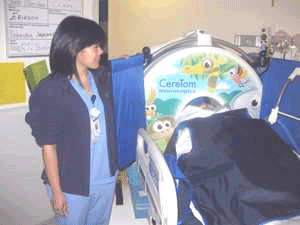
Children's Memorial Hermann Hospital is the first pediatric hospital in Texas to acquire breakthrough imaging technology that makes high-quality, real-time imaging and timely diagnoses possible directly at the patient's bedside or during surgery. The portable CT scanner, called a CereTom®, is the only one of its kind in use in pediatric hospitals in Texas, and is one of only two in use in Level 1 pediatric trauma centers throughout the Midwest region.
"This is an excellent tool that keeps Children's Memorial Hermann Hospital on the cutting edge, specifically in the treatment of traumatic brain injury," said Nathan Strobel, MD, medical director of the Pediatric Intensive Care Unit at Children's Memorial Hermann Hospital and assistant professor of clinical pediatrics at The University of Texas Health Science Center at Houston. "It is innovative and has great potential to improve care for seriously injured and ill patients."
According to a study published in the Journal of the American Healthcare Radiology Administrators, there is a 13 percent morbidity associated with transporting critically ill patients outside of the ICU. The incidence of adverse events during transport specifically for CT imaging is as high as 71 percent.
"We're excited and proud to be among the first to offer this leading technology," said Craig Cordola, CEO of Children's Memorial Hermann Hospital. "Not only can we conduct a scan much more quickly than before, but the portable nature of this device allows us to provide safer, higher quality care to our most critically ill patients."
The CereTom eliminates the time, effort and risk associated with transporting critically ill patients from their hospital beds or operating rooms to a fixed CT scanner. Pediatric patients who are too medically fragile to be transported can now be scanned at the bedside, where critical care providers and parents can be nearby to provide support during the scan. Bedside scans also allow parents to engage in the care of their child and keep the patient calm and still, which results in improved experiences and outcomes.
The technology also has applications in surgery, making it possible for physicians and clinicians to access images in the operating room and determine if a procedure has been successful in real-time, before it is concluded.
In addition to improving patient safety, the scans require less time and fewer clinicians to complete.
"Portable CT scanning in the ICU takes only 18 minutes and a single technologist, compared to four to five personnel required for transport to a fixed CT scan, which takes an average of 50 minutes or more," Dr. Strobel noted.
Pictured: Kimberly Eng, CT technologist at Children's Memorial Hermann Hospital, prepares a patient for testing on the new portable CT scanner.